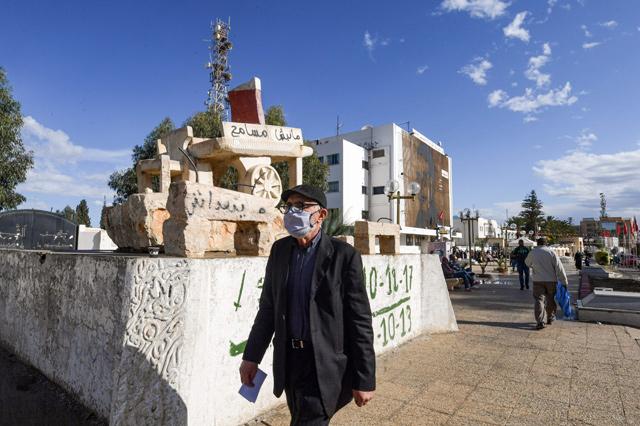- International News
- Tue-2020-12-15 | 04:06 pm

Tunisians may have overthrown dictator Zine Al Abidine Ben Ali a decade ago but, with few reforms to the country’s security forces and an economy rife with nepotism, its revolution is far from achieving its goals.
Ben Ali fled the country on January 14, 2011, with only a few members of his family and his closest aides leaving with him.
The police, the backbone of his rule, stayed largely intact.
Oula Ben Nejma, who led investigations for Tunisia’s Truth and Dignity Commission (IVD), said only 54 interior ministry staff had been sacked in 2011, along with a handful of others two years later.
"They were neither put on trial nor punished,” she said.
"Others have seen their careers continue to develop, including people under investigation... for crimes committed under Ben Ali.”
Following the revolution, some officers were handed heavy sentences for torture, and the state security agency, notorious for torture in the interior ministry’s jails, was dissolved.
Tunisia’s 2014 constitution redefined the role of the police in a democracy, and for a time, NGOs were allowed to make unannounced visits to Tunisian prisoners.
But after this brief opening, "the demons of the past came back”, said Sihem Benseddrine, the former head of the IVD.
The body was set up after the revolt to investigate rights violations under both Ben Ali and Tunisia’s first post-independence president Habib Bourguiba, as well as to hold perpetrators to account and rehabilitate their victims.
But police unions formed since have applied political pressure to protect their own, sometimes raiding the offices of judges investigating alleged abuses.
‘Kamikaze political courage’
Special courts were launched in 2018 to judge 1,400 people on accusations of murder, rape and torture.
But police have hobbled the process, while almost all the officers summonsed have refused to appear.
The IVD, whose mandate ended in 2018, recommended creating an independent police watchdog and an intelligence service answerable to parliament.
Neither have been created.
While torture is no longer practised systematically, since 2013, the World Organisation Against Torture has documented 500 victims and says those responsible enjoy "almost total impunity”.
A string of deadly jihadist attacks in 2015 put a brake on efforts to strengthen the rights of suspects, with security services again given wide-ranging surveillance powers, and a state of emergency that has stayed in place since.
And rather than improving police training or work conditions, political leaders have repeatedly tried to pass a law bolstering officers’ impunity when they use force — although they have backed down after a public outcry.
Still, "it would take almost kamikaze political courage” to fully reform the police and justice systems, said analyst Selim Kharrat, citing their deep political connections.
Holding back change
The judiciary was heavily politicised under Ben Ali.
Today, the most publicly visible magistrates from his era have mostly been sacked — but nothing has been done to hold corrupt judges to account.
In its final report last year, the IVD called for measures to strengthen the independence of magistrates and administrative courts, a subject that featured heavily in the 2019 presidential election.
One of the front-runners in the vote, media mogul Nabil Karoui, was imprisoned for much of the campaign on charges of money laundering and tax evasion dating back several years.
The timing of his arrest stoked accusations of misuse of the justice system.
Tunisia has won plaudits for its democratic transition, its free elections and new liberal constitution, contrasting sharply with the civil wars and ever-more-repressive dictatorships that have taken hold in other countries hit by Arab Spring uprisings.
But reform of Tunisia’s economy and the reduction of gaping inequalities remain a big issue.
"We have made civil and political rights a priority, but we have neglected economic and environmental rights,” said Kharrat.
There has been growing public debate on "crony capitalism”, the system "in which family conglomerates retain control over one of the main inhibitors to change”, he said.
Big players favoured
Ben Ali’s rule had adopted and expanded a system dating back to colonial times, granting certain families a free pass to operate in certain domains while other, less well-connected families were excluded — to the detriment of the country’s development.
Under the system, "the state can require trucking companies to have either a single truck or more than 18, ensuring that big players who were already established shared the market without competition”, said Louai Chebbi, head of Alerte, an NGO which campaigns against the problem.
Each make of car can only be imported by a single agent, giving lucrative monopolies to groups such as Ennakl, formerly owned by one of Ben Ali’s sons-in-law but bought in 2013 by another well-established family.
Overlapping ownership of banks by family-owned conglomerates and the state make access to credit extremely difficult for players who do not already belong to the existing networks.
For example, start-ups working to launch mobile phone payment systems failed for lack of the required 5 million dinars (1.5 million euros), a far higher requirement than in other countries.
Once again, this played to the interests of established actors such as the banks or telecoms operators belonging to the state or to established families, Chebbi said.
He added that such arrangements affect businesses of all sizes, perpetuating nepotism that excludes whole swathes of society from various business sectors.
And in a sign that Ben Ali’s departure did not bring an end to bad habits, Tunisians say corruption has grown.
Between 2010 and 2017, the country fell 15 places in Transparency International’s global index of perceived graft.
This phenomenon and the resulting economic stagnation — exacerbated by the coronavirus pandemic — has fanned nostalgia for the old regime, which carefully portrayed itself as an economic success.
Radhouane Erguez, a consultant at think tank Joussour, warns that such nostalgia could even endanger Tunisia’s democratic transition.
"It could bring into question everything we have achieved on the political level,” he said.













